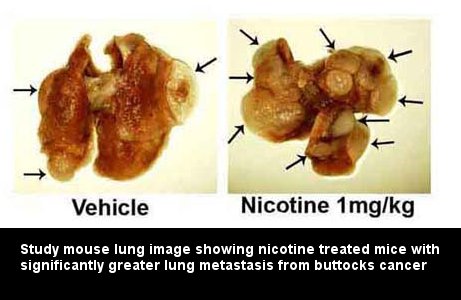
Nicotine causes x3 cancer growth, x9 spreading and x3 regrowth
Why not battle as though already diagnosed with lung cancer?
Imagine being addicted to nicotine, diagnosed with cancer and told by your treating oncologist that it's too late, that the cancer has already spread throughout your body. Now, for the first time, a cancer tumor study in mice suggests the gravity of continuing nicotine use upon tumor growth rates, the rate of cancer spreading (metastasis), and the likelihood of tumor recurrence following surgical removal.
Tumor Growth Experiments - As recounted in an October 20, 2009 study in the journal “PloS One,” Florida researchers injected cancer cells into the flanks of 16 female mice, where the cells were allowed 3 to 7 days to form tumors. Eight of the mice then received two weeks of nicotine injections. The other 8 served as "vehicle" controls.
Mice receiving nicotine injections had "significantly larger tumors." Tumor volume was 3.26 times larger than in control group mice.
Researchers decided to repeat the experiment with 16 new mice to see if nicotine received by 8 mice while wearing 1/30th of a NicoDerm CQ patch would affect tumor growth rates. Again, they saw significantly larger tumors, with 64% greater tumor volume than in control group mice.
Tumor Metastasis Experiments
Next, researchers injected the flanks of 32 additional mice with cancer cells. Sixteen were injected with nicotine 3 times weekly while the other 16 served as controls. The tumors were surgically removed under anesthesia from all mice between weeks 2 and 3. Their skin was stapled and mice recovered on a warmed heating pad. The nicotine group continued to receive nicotine for two additional weeks.
 Mice were then sacrificed and their lungs examined to see if the cancer cells previously implanted in their buttocks had traveled or metastasized to their lungs. Mice receiving nicotine injections were found to have 9 times as many cancer tumors in their lungs (8.1 per mouse) than seen in control group mice (0.9 per mouse).
Mice were then sacrificed and their lungs examined to see if the cancer cells previously implanted in their buttocks had traveled or metastasized to their lungs. Mice receiving nicotine injections were found to have 9 times as many cancer tumors in their lungs (8.1 per mouse) than seen in control group mice (0.9 per mouse).
Researchers also noted that mice who had received nicotine through skin patches had 3 times as many cancer tumors in their lungs as control group mice.
Tumor Recurrence Rate Experiment
Researchers also examined the 32 mice to see if buttocks tumor regrowth had occurred. The cancer tumor recurrence rate was 3.1 times higher in nicotine treated mice (59%) than in control group mice (19%).
Study Conclusions
The authors explain that prior studies had already proven that nicotine causes cancer cells to multiply by interfering with chemotherapy and preventing natural cell death (a process known as apoptosis) and by fostering tumor growth by the creation of blood vessels that feed and nourish tumors (a process known as angiogenesis).
"While nicotine has been demonstrated to induce cell proliferation, angiogenesis and growth of tumors, the studies presented here show for the first time that nicotine patches can promote tumor re-growth and metastasis," writes the study's authors. "Our results also show that a commercially available nicotine transdermal patch can promote the growth of tumors implanted into mice."
What We Know and Don't Know
What we still don't know is how these mice findings will compare to humans. Which nicotine users will develop cancer and at what rates will nicotine cause that first cancerous cell to grow, spread or reoccur?
We're told that nicotine addiction is harder to beat than heroin or cocaine, and as permanent and real as alcoholism. We're told that the average female adult nicotine smoker has a 50% chance of losing 14 years of life, while the average male stands a 50% chance of losing 13 years.
Do you smoke? If so, how would you react if diagnosed today as having cancer, with a 50% chance of losing 13- 14 years of life? Effectively, it's where you now stand. Would you immediately fight to regain those 5,000 sunrises? Then why wait? Sadly, like the 5 million who'll smoke themselves to death this year, half of nicotine dependent smokers already know their cause of death: addiction to smoking nicotine.
Related Nicotine Reading

